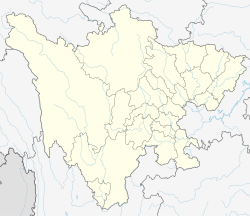| Baiya 柏垭镇 | |
|---|---|
| Town | |
 | |
| Coordinates: 31°27′21″N 105°55′41″E / 31.4558°N 105.9280°E / 31.4558; 105.9280 | |
| Country | China |
| Province | Sichuan |
| Prefecture-level city | Nanchong |
| County-level city | Langzhong |
| Population | |
| • Total | 22,158 |
Baiya (simplified Chinese: 柏垭镇; traditional Chinese: 柏埡鎮; pinyin: Bǎiyā Zhèn) is a town in the county-level city of Langzhong, Nanchong, Sichuan, China. As of 2020, Baiya has a population of 22,158 people.
History
On August 2, 2005, the now-defunct townships of Gaoguan (Chinese: 高观乡), Jinyu (Chinese: 金鱼乡), and Yunong (Chinese: 裕农乡) were merged into Baiya.
Administrative divisions
Baiya administers four residential communities and eight administrative villages.
Residential communities
Baiya contains the following four residential communities:
- Baiya Community (Chinese: 柏垭社区)
- Jinyu Community (Chinese: 金鱼社区)
- Yunong Community (Chinese: 裕农社区)
- Gaoguan Community (Chinese: 高观社区)
Administrative villages
Baiya contains the following eight administrative villages:
- Fulemiao Village (Chinese: 富乐庙村)
- Shangyou Village (Chinese: 上游村)
- Huxi Village (Chinese: 虎溪村)
- Chunfeng Village (Chinese: 淳风村)
- Laofangzui Village (Chinese: 老房嘴村)
- Lujiaoxi Village (Chinese: 鹿角溪村)
- Nandengguan Village (Chinese: 南登观村)
- Junqingsi Village (Chinese: 君庆寺村)
Demographics
According to the 2020 Chinese Census, Baiya has a population of 22,158 people. 3.56% of Langzhong's total population lives in Baiya. The town's males comprised 51.18% percent of the population, while females comprised 48.82% of the population. 13.09% of the town's population is 14 years of age or younger, 49.76% is between the ages of 15 and 59, and 37.15% is 60 years of age or older. 29.72% of Baiya's population is 65 years of age or older.
Historical populations
As of the 2010 Chinese Census, Baiya had a population of 31,235, up from the 19,920 recorded in the 2000 Chinese Census. This increase is likely due to the expansion of the town of Baiya, which incorporated a number of now-defunct townships in 2005.
See also
References
- 2020年统计用区划代码(阆中市) [2020 Statistical Division Codes (Langzhong)] (in Chinese). National Bureau of Statistics of China. 2020. Archived from the original on 2021-09-01. Retrieved 2021-08-31.
- ^ 阆中市第七次全国人口普查公报 [Langzhong Seventh National Population Census Report] (in Chinese). The Municipal People's Government of Langzhong. 2021-08-30. Archived from the original on 2021-09-01. Retrieved 2021-08-31.
- ^ 阆中市历史沿革(第二页) [Langzhong Organizational History (Page Two)]. xzqh.org (in Chinese). 2015-04-16. Archived from the original on 2021-09-01. Retrieved 2021-08-31.
- ^ 2020年统计用区划代码和城乡划分代码(柏垭镇) [2020 Statistical Division Codes and Urban-Rural Division Codes (Baiya)] (in Chinese). National Bureau of Statistics of China. 2020. Archived from the original on 2021-09-01. Retrieved 2021-08-31.
- 阆中市历史沿革 [Langzhong Organizational History]. xzqh.org (in Chinese). 2015-04-16. Archived from the original on 2021-09-01. Retrieved 2021-08-31.
This Sichuan location article is a stub. You can help Misplaced Pages by expanding it. |